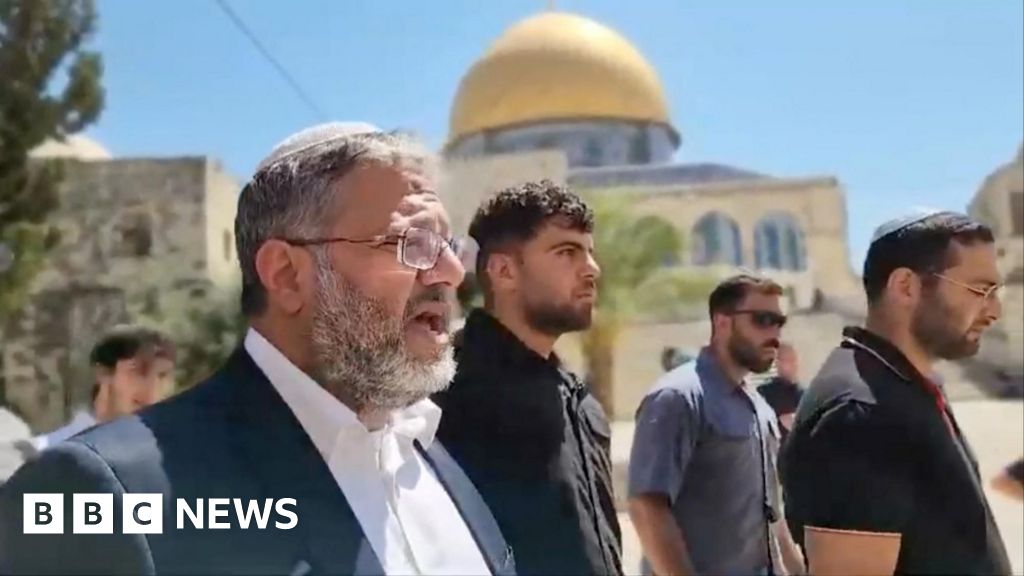A far-right Israeli minister has led hundreds of Jewish Israelis into Jerusalem’s most controversial holy site, many of them defying the Israeli government’s long-standing ban on Jewish prayers.
National Security Minister Itamar Ben-Gvir’s visit to the site of Al-Aqsa Mosque, known to Jews as the Temple Mount, was condemned as provocative by Palestinian leaders as well as the United States, France, the United Nations and several Arab states.
Mr Ben-Gvir said in a video: “Our policy is to enable Jewish prayer.”
However, the Israeli Prime Minister’s office insisted that there had been no change in the status quo, which allows only Muslim worship there.
For Jews, this place is the holiest place because two biblical temples stood here. For Muslims, it is the third holiest place because they believe that the Prophet Muhammad ascended to heaven here.
Located in occupied East Jerusalem, the site was captured by Israel from Jordan in the 1967 Middle East war. Under the status quo, Jordan was allowed to continue its historic role as guardian of the site, while Israel assumed control of security and access.
Palestinians accuse Israel of taking steps to undermine the agreements and complain that in recent years Jewish visitors have often been seen praying without being stopped by Israeli police.
Videos shared on social media on Tuesday showed groups of Jewish Israelis singing the Israeli national anthem, some carrying the Israeli flag, while others prostrated themselves in prayer at the edge of the holy site.
Itamar Ben Gvir visited the complex accompanied by Israeli police and said that “great progress” had been made there in Israel’s “governance and sovereignty.” “Our policy is to enable Jewish prayer,” he continued.
He also stated that Israel must “win the war” in the Gaza Strip and not interfere in talks on a ceasefire and the release of hostages in order to “bring Hamas to its knees”.
The office of Israeli Prime Minister Benjamin Netanyahu later said the incident “deviated from the status quo.”
“Israel’s policy regarding the Temple Mount has not changed; it was and will be,” they stressed.
In response to this statement, Ben-Gvir said that his policy was to “enable Jews everywhere to practice their religion freely.”
“There is no law that allows racial discrimination against Jews on the Temple Mount or anywhere else in Israel,” he added.
However, the Palestinian Foreign Ministry expressed deep concern about the “dangerous escalation following attacks by extremist settlers on the blessed Al-Aqsa Mosque”.
“The ministry will continue its political efforts to address these provocations at various levels and warn of their serious consequences for the conflict area and the entire region,” it said in a statement.
The Jordanian Islamic Waqf Foundation, which manages the site, said more than 2,000 Israelis had entered the compound and appealed to Muslims around the world to help maintain the status quo.
The Jordanian Foreign Ministry said the incident reflected “the insistence of the Israeli government and its extremist members to disregard international law and Israel’s obligations as an occupying power.”
Egypt and Saudi Arabia also said the incident violated international law. Egypt added that Ben-Gvir had tried to thwart attempts to mediate a ceasefire in the Gaza Strip.
In a statement, US Secretary of State Antony Blinken said Mr Ben-Gvir’s visit “shows a blatant disregard for the historic status quo regarding the holy sites in Jerusalem.”
“These provocative actions only increase tensions at a crucial moment when all attention should be on ongoing diplomatic efforts to reach a ceasefire agreement, secure the release of all hostages, and create the conditions for broader regional stability,” the top US diplomat added.
The French Foreign Ministry condemned Ben-Gvir’s visit, saying: “This new provocation is unacceptable.”
UN spokesman Farhan Haq described the incident as “unhelpful and unduly provocative,” adding: “We oppose any efforts to change the status quo within the holy sites.”

